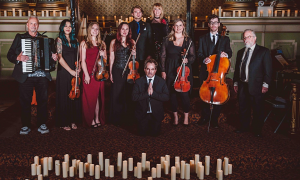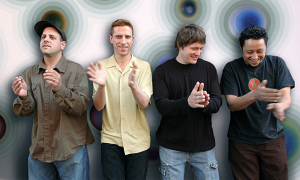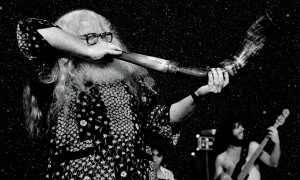Home » Jazz Articles » From the Inside Out » Jazz Finery Again Awakens
Jazz Finery Again Awakens
The Holmes Brothers play rock n
 Verve//Unmixed2 (Verve)
Verve//Unmixed2 (Verve)
This compilation presents the source material, the original Verve sessions (most produced by Norman Granz or Creed Taylor) for the Verve//Remixed2 project. Female vocalists dominate, with two songs each from Nina Simone and Ella Fitzgerald plus tracks by Astrud Gilberto, Betty Carter, and Sarah Vaughan. Unmixed2 cuts from Cal Tjader, Willie Bobo, and Dizzy Gillespie also highlight VerveÂ's contributions to Latin jazz.
Co-composed with Walter Fuller and Chano Pozo, "Manteca" is one of Gillespie's most enduring and hard-driving Latin vehicles, and this celebrated live at Carnegie Hall concert recording gets rocked hard by bassist Art Davis and three percussionists. Gillespie is all fire and brimstone business, and the percussion break before the climactic call-and-response ending is the stuff of musical legend. Gillespie and Pozo also co-wrote this title track to Tjader's Soul Sauce LP, served in barely more than a quick dash but still spilling over with Tjader's vibes. Willie Bobo, one of Tjader's percussionists on "Sauce," continues to serve just the right mix of relaxed groove and hot Latin spice in the next cut, "Fried Neckbones and Some Homefries."
Miss Sarah is the very personification of sophistication as she sashays through "Whatever Lola Wants" from Damn Yankees, while Ella glides with the Nelson Riddle Orchestra through the Gershwin's "Slap That Bass" from the Astaire/Rogers' film Shall We Dance, then returns with the sad ballad "Angel Eyes" in duet with whispering guitarist Barney Kessel.
Ramsey Lewis on electric keyboards rocks hard with bassist Cleveland Eaton and Earth Wind & Fire founder and stalwart Maurice White on drums through "Do What You Wanna," one of those old-school, good-time soul instrumentals that modern music sadly seems to have left behind - yet still sounds simply great.
The Holmes Brothers: Simple Truths (Alligator)
Simple Truths is an album full of songs like that, but with gospel and blues vocals, too.
The Holmes Brothers play rock n' roll like a band that grew up playing the blues on Saturday night then played gospel in church on Sunday morning: Popsy Dixon on drums, Wendell Holmes on guitar and keyboards and Sherman Holmes on bass, play rough and tumble with the blues; but their vocal harmonies, most often casting Sherman's baritone and Popsy's falsetto in harmony with Wendell's rough leads, ring like a churchbell with sweet, sweet gospel (their hometown: Christchurch, Virginia).
Simple Truths rings both simple and true, from its abundance of classics by such songwriters as Hank Williams, Willie Nelson, Townes Van Zandt, and Bob Marley, to its other blues ("Big Boss Man") and R&B (Bruce Channel's soul-stirring "Hey Baby") classics, its four new originals, even to its bluegrass-y, hop-skippity up-tempo cover of "Shine" by grunge-popsters Collective Soul (which comes off better than the idea might sound).
Like a musical summit between the Five Blind Boys of Alabama and George Thorogood & his Delaware Destroyers, "Run Myself Out of Town" opens up a can o' good old-fashioned rock & roll whoop-ass then sweetens when serving with heavenly gospel harmonies. A grinding, metallic "I'm So Lonesome I Could Cry" also shoots off sparks, raw old-school Chicago screaming electric guitar blues possessed by the spirits of Son Seals and Hound Dog Taylor.
"Hey Baby" is another one of those cool little songs of the kind you almost never hear any more: Close your eyes and imagine Ray Charles (Sherman) on vocals soulfully swinging unplugged, acoustic guitar backporch funk with Eric Clapton (Wendell and guest guitarist Chris Bruce).
The Holmes Brothers have been performing together since the late 1970s. Their resume includes sessions by Peter Gabriel, Van Morrison, the Jungle Brothers, and Joan Osborne, who also asked them to be her backing band when she toured opening for Bob Dylan. You can also hear The Holmes Brothers supporting Osborne, Odetta, Phoebe Snow, and Victoria Williams on Shout, Sister, Shout (M.C. Records), a tribute album to Sister Rosetta Tharpe.
 Rewind3! Original Classics Reworked, Remixed, Reedited and Rewound 3 (Ubiquity)
Rewind3! Original Classics Reworked, Remixed, Reedited and Rewound 3 (Ubiquity)
"The Rewind concept is simple: a selection of our current favorite artists, producers, and bands record new versions of tunes that inspired them to make the music you love 'em for now."
On Rewind3, Ubiquity's international roster of jazz and electronic artists from the US, England, Portugal, Italy, and Sweden, puts their unique spin on material by Herbie Hancock, Sun Ra, and Gil Scott-Heron, plus AC/DC, the Monkees, and Johnny Cash. Unlike previous Rewinds, though, 3 contains NO remixes or re-edits - every track is a brand new cover version.
Rewind3 begins deep in the verdant rainforest of "Jungle Fever," Louie Vega's update of the Chakachas' exotic Latin funk underground classic. With the next track, the groove quickly shifts to the danceclub, where it generally remains, Greyboy chopping up the beats and mixing new vocals into "Genevieve." Aurora Dawn's lead vocal fuels Spiritual South's retro-soul yet modern club feel of "Stars and Rockets," nicely programmed into the Spaceboys' broken-beat reconstruction of Sun Ra's pre-ancestral, post-modern "Space is the Place."
Electric jazz-funk has proven fertile ground for dancefloor samplers, and on Rewind3 John Arnold with Ayro (Jeremy Ellis) thump out "Rough" from Herbie Hancock's Future Shock album, then Ellis splashes new colors on Hancock's classic "Chameleon." Other "new twists on old favorites" seem more mutant and obscure, such as the artist Nobody's deep space exploration of the Monkees' "Porpoise Song," This Kid Named Miles' dubby ska highstep through Cash's "Ring of Fire," and Bing Ji Ling's slippery neo-soul version of AC/DC's "All Night Long."
 Ulu: Nerve (Harmonized)
Ulu: Nerve (Harmonized)
The musical journey of the quartet Ulu - Scott Chasolen on keyboards, Josh Dion on drums, Brian Killeen on bass, and Aaron Gardner on tenor saxophone and flute - has crossed paths with such inventive jazz, groove, and jam-band musicians as John Scofield, The Mickey Hart Band, the Dirty Dozen Brass Band, Moe., Soulive, The Jazz Mandolin Project, De La Soul, and The Greyboy All-Stars. Ulu released their eponymous debut, recorded in their home studio, in 1998; in 1999, they were the only all-instrumental act invited to perform at Woodstock '99, and they've subsequently released two live recordings. This fourth album is all new studio material plus a set-ending instrumental cover version that comes near to the adventurous spirit if not quite the sound of David BowieÂ's "Space Oddity."
Even if just from their similar instrumentation, Ulu strongly sounds like another modern groove/jam organ trio (Medeski Martin & Wood) riding with a bad-ass tenor player (Gardner) roughshod over funky jazz-rock fusion. This MM&W comparison is inevitable from the first bars of the opening "Where's Paul" and only grows stronger as Nerve expands and deepens its instrumental reach in "All You Can Eat" and "Rollin,'" big fat hot buffets of computer-age yet old-school tenor/organ cool groove and jam. It's a powerful undertow that pulls the listener's ear swirling in a whirlpool of fusion and funk.
Though Never grooves, it does more than groove too. "The Tragic Flight of Sir Donkey Hawk" navigates jazz-rock of Zappa-esque stature, strains of rock and jazz intertwined in the keyboard and sax solos and in the rhythm section churning underneath, discharging in bizarre, unintelligible chanting and cacophony. "Bovine Confines" distorts the saxophone and keyboards to bleed their screaming into each other (a pro-vegetarian instrumental tone poem?) yet also wanders down several other instrumental alleys, including a mainstream piano solo and brief Latin shimmy. "Spare Tissue" sounds oddly timed, like King Crimson, and suggests other reference points like Emerson Lake & Palmer that are more progressive rock than progressive jazz.
 Verve//Remixed2 : (Verve)
Verve//Remixed2 : (Verve)
"When we first started working on the Verve Remixed project four years ago, we were excited at the chance to have some of our favorite DJs and producers apply their unique musical ideas to the classic, timeless jazz in the Verve vaults," co-producers Dahlia Ambach Caplin and Jason Olaine wrote in the liner notes to Remixed2. "Our hope was that Verve Remixed would help many new fans discover or rediscover some of the greatest jazz artists of all time while allowing many longtime jazz heads to hear the inherent connections between jazz and electronic music."
Remixed2 presents the same track order as Unmixed2 but in new versions remodeled and reconstructed by floor-cutting, cutting-edge remixers and producers. Tracks that rocked on Unmixed2 mainly sound improved on Remixed2: Mr. Scruff more than doubles the playing time of "Do What You Wanna," chopping in extra funk with a boogaloo drum beatdown and additional guitars; in "Soul Sauce," Fila Brazillia scratches starts and stops in Latin time and cushions the production in a soft space-age glide; and Dan the Automator (beatmaster for the hip cartoon rock ensemble Gorillaz and also more notoriously known as Dr. Octagon) punches up the percussion and beats in his urban dancefloor guerilla update of "Fried Neckbones."
Reinterpretation particularly benefits tracks by Archie Shepp and Hugh Masakela. "Blues for Brother George Jackson" appeared as a bittersweet large ensemble blues on Shepp's Attica Blues in turbulent 1972, months after the New York prison uprising; Mondo Grosso (real name: Shinichi Osawa) cuts and pastes Shepp's melody and horn section statements into new multicolored musical streamers then strings them along a thumping house beat, creating modern dance music from modern jazz. South African trumpet player Hugh Masakela recorded "Mama" in 1975 Nigeria as a mixture of Afro-pop and American funk, R&B, even early disco. This Birthday Dub by Metro Area (Morgan Geist and Darshan Jesrani) remixes "Mama" into even more cross-pollinations, including modern house and dub music. This sparkling new music defies categorization.
The Funky Lowlives' Remix of "Manteca" percolates with hot rhythm and percussion, its pulse quickened by Brad WaissmanÂ's additional double-bass, and, like Gillespie's original on Unmixed2, shines among the other choice material on Remixed2.
< Previous
Trumpeter Enrico Rava
Next >
Ceremonial
Comments
Tags
For the Love of Jazz
 All About Jazz has been a pillar of jazz since 1995, championing it as an art form and, more importantly, supporting the musicians who create it. Our enduring commitment has made "AAJ" one of the most culturally important websites of its kind, read by hundreds of thousands of fans, musicians and industry figures every month.
All About Jazz has been a pillar of jazz since 1995, championing it as an art form and, more importantly, supporting the musicians who create it. Our enduring commitment has made "AAJ" one of the most culturally important websites of its kind, read by hundreds of thousands of fans, musicians and industry figures every month.






















